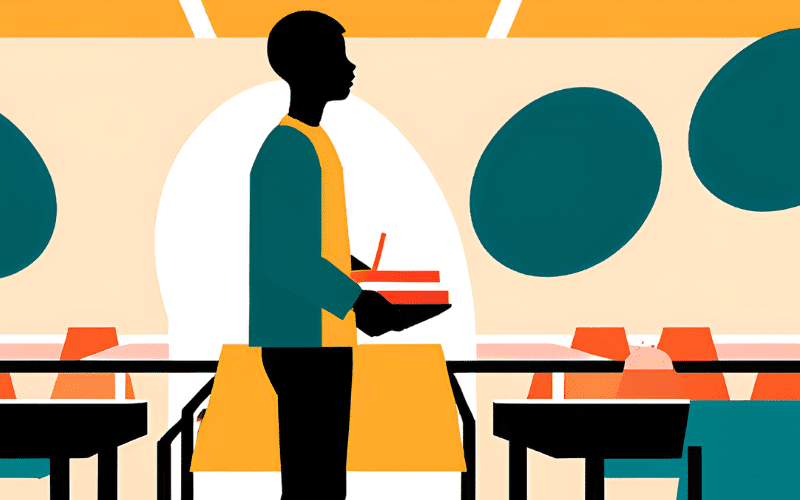“It’s essential that we acknowledge and seriously reckon with the extreme harms caused by one of the most popular legal and regulated drugs on the planet: alcohol” -James Wilt, Drinking Up the Revolution: How To Smash Big Alcohol and Reclaim Working-Class Joy

Almost 80 percent of Canadians drink alcohol. Taking issue with alcohol’s ubiquity in our world, but rooted in harm reduction politics, is author James Wilt. His 2022 book Drinking Up the Revolution: How To Smash Big Alcohol and Reclaim Working-Class Joy poses capital as the biggest driver of alcohol’s harms, exploiting collective grief and trauma to convince people they need to buy and drink more.
Wilt rejects preaching against individual ‘problem drinkers’; he says his book is “not another call for prohibition or more governmental control, but is instead a cry to take back alcohol for the people,” and make it safe and fun for those who want to use it. He looks at all substance use as interlinked and watches it become more prevalent with every social crisis.
When The Canadian Centre on Substance Use and Addiction issued Canada's Guidance on Alcohol and Health update in January 2023, many people were surprised and defensive. The prior 2011 guideline indicated a standard weekly drink limit of 15 for men, 10 for women. Now, low risk is considered two drinks or less a week and moderate risk is considered less than six drinks, though your risk of developing several types of cancer, including breast and colon cancer, increases at this level. Seven and above is now considered significantly higher risk of heart disease or stroke and each additional drink radically increases the risk of alcohol-related consequences.
The Hoser sat down with Wilt to ask about his research into Big Alcohol, viable alternatives to alcohol-infused joy and how Canadians can have better conversations about the omnipresent substance in light of the new science.
The Hoser: Why do you see alcohol as one of the biggest threats to working class joy?
James Wilt: It's not so much that I see alcohol itself as a threat to working class joy; alcohol for a very long time has been a central part of how people socialize and relax, experience altered consciousness and all these sorts of things. There's a lot of good reasons for why it's part of people's recreational and leisure activities.
What I argue in the book is that there's a lot of negative health and social consequences that come with alcohol use that aren't necessarily disclosed by the industry. As a result, people's understandable desires to experience joy and relaxation can come with not so rare consequences.
Alcohol will probably continue to be a central part of our society for a long time, but the case I make is that people should have other options as well, because the consequences of alcohol use can be quite dire.
TH: What was your reaction when Canada's Guidance on Alcohol and Health came out?
JW: It was as shocking for me as it was for a lot of people. Part of that is because Canada's previous guidelines were quite outdated, which is why they did this update. The reason the levels [of alcohol use] were dropped so significantly was in large part due to the cancer risk associated with alcohol use; people being aware of that is a good thing.
The way it was rolled out at this particular juncture in time is also complicated because the cost of living is going up, people's wages are declining in proportion to those costs, it feels like there's ever more privatization and austerity and fewer options to actually experience joy. Part of the backlash against the guidelines is probably informed by people's anger about that, which is completely understandable.
With that said, I don't think it's the job of the people who created the guidelines to necessarily address that, I think it's the job of the political left to say: “Okay, these are the scientifically informed guidelines, we're going to take this seriously but we're also going to fight for more opportunities for the working class to have joy,” which includes fighting alienation and exploitation at the workplace all the way to more public spaces or more access to different kinds of drugs.

TH: What are your thoughts on the public response to the latest guidelines?
JW: How we think about public health is informed by the ongoing COVID-19 pandemic and the way public health has just been really weakened and people's perceptions of it are very damaged, understandably. I think that's one factor in terms of why public health messaging is not taken as seriously as it once was. Another reason is because a lot of people use alcohol and enjoy alcohol. To be told that something you have long used is now, all of a sudden, damaging, or more damaging than perceived, can create a knee jerk reaction. Again, I understand these impulses.
My argument is we do need to take these scientific findings seriously for the same reason that we take, for example, science about climate change [and] greenhouse gas emissions, or tobacco smoking causing lung cancer, seriously. These are well-established causal relations, which have now shaped the political struggles we're a part of.
When it comes to alcohol, the response should not be to dismiss the science because we find it uncomfortable or because we have certain relationships with alcohol. Rather, it's to meaningfully grapple with it and then to struggle for structural changes that allow people to have low risk relationships with alcohol; it is a principle of harm reduction. It's the idea that people are going to continue to drink and it's not about stopping that, per se, it's about creating a world in which people can drink without necessarily having these dire consequences.
TH: What are some of the alternative options to alcohol you see?
JW: A big one is legalizing and regulating other drugs. We know that there are a lot of other drugs which, while not risk free, have lower risk associated with them. A lot of psychedelics like mushrooms, LSD, MDMA — again, not risk free — but they can provide people experiences they may want to pursue, without the risk of, say, cancer.
If we're going to be pursuing this sort of legalization and regulation, which we should, we need to learn from what's going wrong with alcohol production — the way it has been commercialized and monopolized by massive multinational corporations so that drinking is pushed by incredibly powerful financial interests. The legalization, regulation of these other drugs needs to be done through public and collective ownership, to eliminate the profit motive and ensure people are using it in a way which really does prioritize the use values rather than the profits to be made.
Another obvious [solution] is just providing more public spaces where people can be and experience joy in all sorts of different ways that don't mandate alcohol use–more public parks and amenities and also, for example, late night venues where people can go and hang out with their friends and not necessarily have to drink as part of that; they can, but it doesn't have to be part of that experience.
TH: How do you think Big Alcohol differs from Big Tobacco, for example, in the public's perception of its danger?
JW: Big Alcohol, the concept I use to refer to not only the producers, but the large distributors and retailers as well, [has] learned from what happened with Tobacco. In response, Big Alcohol has tried to position itself as a voluntary participant in reducing alcohol harms, in the same way oil companies are now positioning themselves as participants in the transition to a low carbon renewable future. They've created all sorts of PR organizations. You'll notice on every ad, there's the ‘Drink Responsibly’ message. All of that is part of this framing which really does individualize drinking and its harms, which means the alcohol company itself has no responsibility for what happens. So far, it's been quite successful.
Most governments are very reluctant to implement strict regulations on alcohol… there's no nutritional labeling, no health warnings, no standardized cans, no plain packaging. By positioning itself as a good faith player in reducing alcohol harms, [Big Alcohol] has been able to avoid a lot of those regulations.
TH: Our audience is Toronto-based where most recreation has alcohol built into it. Are there individual steps working class people can take, apart from policy change?
JW: With the disclaimer that everyone has their own relationship with alcohol, and I try to avoid prescriptions on that basis, the general takeaway we're learning from public health studies is that less alcohol is better. That does not mean no alcohol, which some people like to claim. It just means every drink you're regularly taking adds up in terms of health impacts over time. That's especially true if someone is drinking well above guidelines; each reduction has significant improvements to one's own health. That in itself is something people can negotiate for themselves, but at the same time, I don't think it's that simple. I push for the idea of substitution, in a sense that people need to be finding other things to do with their time, not just to tell them to stop or to reduce drinking.
Certain patterns of substance use are fundamentally related to people's feelings of alienation, exploitation, loneliness and disempowerment. A really important response to that is for us to be collectively building political organizations and shared struggles, where we can come together and feel like we're part of something.
I don't want to [say], “join a political organization and you'll no longer have the desire to drink.” That's not true, but it's through those shared struggles that we can begin to rebuild our sense of community and togetherness. It also gives us collective power to actually demand the end of criminalization of other drugs, to demand public spaces which aren't privatized and securitized, to demand unionization and more control over our workplaces.
For some people, the idea of talking about joy almost seems frivolous, given that a lot of people can't afford groceries. For a lot of people, it's just about basic survival, so it's also about trying to address people's basic needs through fighting for food security, public housing, anti-evictions — all these sorts of things [that] aren't necessarily related to alcohol policy in a strict sense. It is part of this more holistic framework that we have to be thinking about.
TH: Is there anything else Hoser readers should know?
JW: One of the most inspiring examples of organizing around alcohol is called Managed Alcohol Programs (MAPs). This is a specific response for people who are mostly unhoused and may have alcohol use issues. It is basically a prescribed dosage of alcohol given throughout the day to prevent people from using non-beverage alcohol, or having to resort to petty theft or these sorts of things. It's a hyper-specific example, but the way that it addresses alcohol use should be taken as a framework for how we can think about this big picture.
I'm not suggesting everyone needs to be using MAPs, by any means, but I think the way to understand it is that alcohol use [is] a spectrum, and the goal is to reduce harm. It's not to demand abstinence… it's just to say, “let's create a structure,” and in some cases, a political organization, where people can freely discuss and negotiate their own alcohol use in a way which isn't shame-based, which isn't stigmatizing and which genuinely cares about their health.
You can check out Wilt’s “Drinking Up the Revolution” here.















